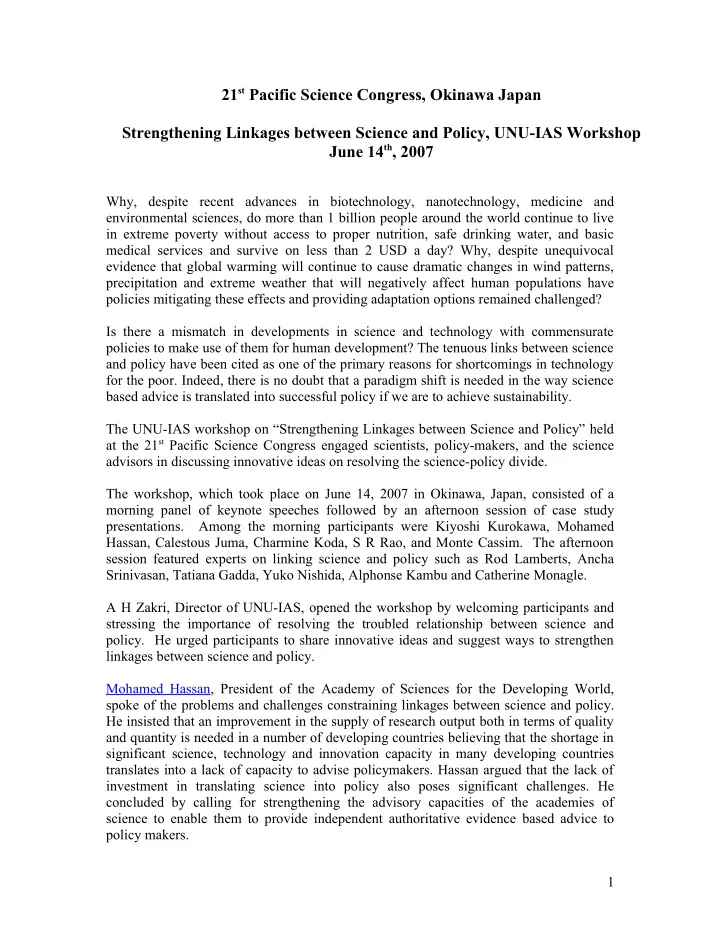

21 st Pacific Science Congress, Okinawa Japan Strengthening Linkages between Science and Policy, UNU-IAS Workshop June 14 th , 2007 Why, despite recent advances in biotechnology, nanotechnology, medicine and environmental sciences, do more than 1 billion people around the world continue to live in extreme poverty without access to proper nutrition, safe drinking water, and basic medical services and survive on less than 2 USD a day? Why, despite unequivocal evidence that global warming will continue to cause dramatic changes in wind patterns, precipitation and extreme weather that will negatively affect human populations have policies mitigating these effects and providing adaptation options remained challenged? Is there a mismatch in developments in science and technology with commensurate policies to make use of them for human development? The tenuous links between science and policy have been cited as one of the primary reasons for shortcomings in technology for the poor. Indeed, there is no doubt that a paradigm shift is needed in the way science based advice is translated into successful policy if we are to achieve sustainability. The UNU-IAS workshop on “Strengthening Linkages between Science and Policy” held at the 21 st Pacific Science Congress engaged scientists, policy-makers, and the science advisors in discussing innovative ideas on resolving the science-policy divide. The workshop, which took place on June 14, 2007 in Okinawa, Japan, consisted of a morning panel of keynote speeches followed by an afternoon session of case study presentations. Among the morning participants were Kiyoshi Kurokawa, Mohamed Hassan, Calestous Juma, Charmine Koda, S R Rao, and Monte Cassim. The afternoon session featured experts on linking science and policy such as Rod Lamberts, Ancha Srinivasan, Tatiana Gadda, Yuko Nishida, Alphonse Kambu and Catherine Monagle. A H Zakri, Director of UNU-IAS, opened the workshop by welcoming participants and stressing the importance of resolving the troubled relationship between science and policy. He urged participants to share innovative ideas and suggest ways to strengthen linkages between science and policy. Mohamed Hassan, President of the Academy of Sciences for the Developing World, spoke of the problems and challenges constraining linkages between science and policy. He insisted that an improvement in the supply of research output both in terms of quality and quantity is needed in a number of developing countries believing that the shortage in significant science, technology and innovation capacity in many developing countries translates into a lack of capacity to advise policymakers. Hassan argued that the lack of investment in translating science into policy also poses significant challenges. He concluded by calling for strengthening the advisory capacities of the academies of science to enable them to provide independent authoritative evidence based advice to policy makers. 1
Calestous Juma, Director of the Science, Technology and Globalization Project at Harvard University’s Kennedy School of Government, spoke of how advice on policy making is context-dependent. He stressed the importance of shifting from science and technology advice to innovation policy, of involving the private sector and universities, and of fostering continuous interaction between various actors. Juma suggested that effective advice must have a strategic vision and correct policy context and cited the example of a how a newly elected government can be the most receptive partner in the dialogue. Juma highlighted some of the most important issues including the early identification of problems, the importance of a diversity of inputs, the necessity for an open and inclusive platform, and the need for review and feedback. Juma concluded by calling for the strengthening of science advisory positions. While Hassan and Juma provided an overview and some suggestions for linking science and policy in terms of context and content, Charmine Koda, Director of the United Nations Information Centre in Tokyo, Japan, enriched the discussion by focusing on how the media can play a role in strengthening these linkages and how communicating complex messages in simple language still proves to be a challenge for scientists and policy makers alike. She noted that a difference in style that exists between scientific and media reports. While the media tends to cover immediate ‘crisis’ and attention-getting issues, scientific reports are usually long-term, research oriented publications that are written for a scientific audience. Koda mentioned that in order for scientific research to be widely read and appreciated it is important for scientists to establish a personal relevance to the issue and try to teach it to the public concisely. Following Koda’s presentation on the importance of the medium in communicating science, Kiyoshi Kurokawa, President of the Science Council of Japan and the Pacific Science Association stressed the role of scientists in identifying the target audience. He compared scientific work to a movie and suggested that contemporary scientists were trying to be the director, the producer, and the actor all at once. He insisted that this was one of the major setbacks of scientists in communication as their expertise is research and not communication. Kurokawa said that it was important for scientists to target a specific audience in every situation and not get lost trying to address the general public at once. S R Rao, Ministry of Science and Technology, Government of India and President of the Indian Society for Marine Archaeology, discussed the dynamic nature of linkages between science and policy in relation to the specific example of India. He stressed that there were practical gains in linking science to policy in developing countries, including exposure to world class research and development, attraction of foreign investment, and streamlined transboundary movement of natural resources. He also insisted that stakeholders should be directly included in science and policy decisions and that future institutions and universities need to be reorganized to include a research and implementation course. He cited examples of how science provided a platform for rapid developments in policy in areas such as space technology while policy provided platform for development in information and communication technology in India. He provided some views on various dynamics and flow of links between science and policy. 2
Recommend
More recommend